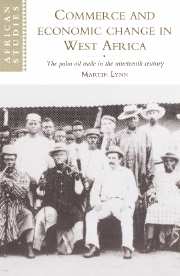Book contents
- Frontmatter
- Contents
- List of maps
- List of tables
- Preface
- List of abbreviations
- Introduction
- Part I The development of the palm oil trade in the first half of the nineteenth century
- 1 The West African trade in transition
- 2 African producers and palm oil production
- 3 African brokers and the growth of the palm oil trade
- 4 British traders, British ports, and the expansion of the palm oil trade
- Part II The restructuring of the palm products trade in the second half of the nineteenth century
- Conclusion
- Notes
- Select bibliography
- Index
- Other books in the series
2 - African producers and palm oil production
Published online by Cambridge University Press: 04 December 2009
- Frontmatter
- Contents
- List of maps
- List of tables
- Preface
- List of abbreviations
- Introduction
- Part I The development of the palm oil trade in the first half of the nineteenth century
- 1 The West African trade in transition
- 2 African producers and palm oil production
- 3 African brokers and the growth of the palm oil trade
- 4 British traders, British ports, and the expansion of the palm oil trade
- Part II The restructuring of the palm products trade in the second half of the nineteenth century
- Conclusion
- Notes
- Select bibliography
- Index
- Other books in the series
Summary
The production of palm oil for the market in the nineteenth century was nothing new for West Africa. Palm oil production for domestic consumption, for local trade, and for provisioning transatlantic slave ships was long established in the region. None the less the great expansion of oil production for export from the 1810s onwards clearly marked a change for West African producers. That this growth could occur so rapidly is a tribute to the enterprise and adaptability of producers in the interior of the region; the story of the massive increase in West Africa's palm oil production in these years is at root the story of the skills and dynamism of West African producers. Yet what is striking about the response of West Africans to this increase in oil exports is the degree to which it occurred within existing structures. Important changes did result from this increase in exports – in the utilisation of labour and in gender relations not least – but as will be seen these developments were accommodated within the continuing productive relationships of the region.
Although palm oil production was widespread throughout the forest regions of West Africa, during the first half of the nineteenth century a number of peoples began to extend their production of oil for export. Clearly underlying this was the shift in the terms of trade in this period which made it so rewarding to increase export production. By itself, however, this does not explain why particular areas turned to oil production on such a large scale. Significant in this were environmental conditions – the distribution of oil palms and access to water communications – together with the availability of labour for production and transport.
- Type
- Chapter
- Information
- Commerce and Economic Change in West AfricaThe Palm Oil Trade in the Nineteenth Century, pp. 34 - 59Publisher: Cambridge University PressPrint publication year: 1997

